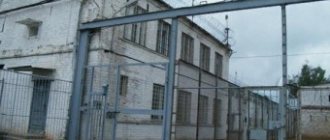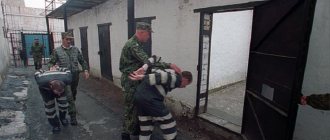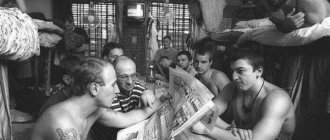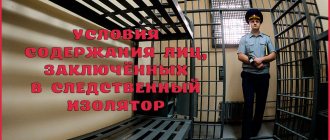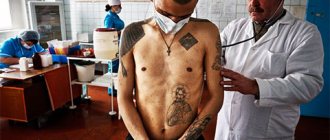The concept of a maximum security colony. Who is contained in them?
A maximum security colony is one of the most stringent closed-type correctional institutions, where persons who are the most socially dangerous to citizens and society as a whole are serving their sentences based on a court verdict, and therefore require strict isolation. Such especially dangerous citizens, as a rule, end up there for committing serious or especially serious intentional crimes, for example, the intentional murder of two or more persons, contract killing, or especially dangerous recidivism. The conditions of detention in such a correctional institution as a maximum security colony are quite strict and severe, which is manifested in a large number of restrictions and complete isolation.
News
Life in a Russian prison is torture. And this torture is organized by employees of the Federal Penitentiary Service.
When a person is in a correctional facility, he is prohibited, if not everything, then a lot. The prohibitions are often ridiculous, and the requirements for prisoners from the administration are stupid and can subsequently ruin the chances of being released on parole (parole).
For keeping “prohibitions”, i.e. items and substances prohibited by the “Internal Regulations” (IVR) (Order of the Ministry of Justice of the Russian Federation of December 16, 2021 No. 295), the administration can draw up an act of violation of the regime and apply sanctions as punishment (place in a punishment cell or punishment cell). The prohibited item is naturally confiscated from the prisoner.
Any, even the smallest, documented violation is added to the prisoner’s file and stored there until the end of the sentence. If there are such documents in the case, this is taken into account when preparing the characteristics of the convicted person for consideration of the application for parole. The position of the judiciary, despite the decision of the Plenum of the Supreme Court (the Plenum of the Supreme Court decided that the refusal of parole for prisoners should not depend on the presence of penalties received for violations of the rules of the colony. “... the specific circumstances, the severity and nature of each committed by the convicted person should be taken into account violations for the entire period of serving the sentence"), is clear: if a prisoner has violations, he will be denied parole.
If a prisoner has many violations, the colony staff may recognize him as a persistent violator of the regime and change the conditions of detention - naturally, to more strict ones.
The first stage is transfer to SUS (strict conditions of detention): SUS is a barrack fenced off from the rest of the living area, where living quarters are arranged according to the principle of cells. The second stage is transfer to a PKT (cell-type room): the convicted person serves his sentence in a cell designed for several people (usually 4). The third stage is transfer to the EPKT (single cell-type room): the prisoner is completely isolated from other prisoners. The fourth stage is transfer to a so-called indoor prison, located, as a rule, in another region.
Convicts whom the IK commission has recognized as malicious violators of the regime are transferred to the SUS, PKT, EPKT (for this it is necessary to be repeatedly placed in a punishment cell). They are transferred to SUS for several months (usually 9 or 12).
For a convicted person who has many penalties, the court, on the initiative of the EC, may assign administrative supervision. This means that when a person is released, he will still have to live in a certain regime.
According to Federal Law No. 64-FZ of April 6, 2011 “On administrative supervision of persons released from prison,” a person under supervision is prohibited from attending mass events, he needs to stay at home at certain hours (usually from 9 pm until the morning), he cannot travel far from home and must report to the police department several times a month.
Ridiculous prohibitions and duties of prisoners, which most often lead to the fact that a report is drawn up against the convicted person. The convict will end up in a punishment cell - and this happens more than once - and then, when he is released from the colony, most likely, he will live under supervision
1. You can’t take off your hat on the street.
In the summer, especially in regions with a sharply continental climate, it is unbearably long to be outside in a black camp cap: this can simply lead to heatstroke. However, temporary detention centers categorically prohibit prisoners from being on the street without hats. A prisoner who leaves the barracks for a couple of minutes to smoke and forgets to put on his cap is a violation of the regime. Some convicts who have recently arrived in the zone naively believe that they will have time to see the employee and return to the barracks building unnoticed. But we must understand that if a prisoner does not see a correctional officer, this does not mean that the administration will not find out about the “violation”: there are external surveillance cameras in the colony, and employees closely monitor what is happening on the monitors.
The actions of an employee who sees a prisoner without a cap on the street have been worked out. He takes a screenshot of the screen and records the violation. And then the convict is called to the duty station, where his data is recorded (full name, personal number, beginning and end of the term, articles of the criminal case), and a violation report is drawn up. This act is considered by a commission, where it is decided how to punish the offender. Usually the punishment is placement in a punishment cell for several days.
2. You cannot unbutton the top button on your robe.
3. Do not remove the upper part of the robe (even in hot weather)
This “violation” is often used by correctional officers to formalize penalties against intractable convicts. Thus, prisoners assigned to heavy physical work during the hot summer period receive verbal permission from the administration to remove the upper part of their uniform. After a prisoner disliked by the correctional officers takes off his outer clothing, this action will be documented as a violation. The fact that the entire team with which he worked was also in overalls without a top will remain unnoticed.
4. You cannot take bread or other food out of the dining room.
This is perhaps the most ridiculous ban in the colonies. Taking into account the fact that the gruel served in the canteen is unsuitable for proper nutrition, and there is no point in eating simple bread, prisoners take it with them to the barracks: bread in the prisoner’s diet is necessary as an addition to the products transferred from the outside or purchased in the prison store. You can buy bread in the colony store, but this opportunity only appears a few times a month. For one piece of bread found on a prisoner, he faces 3 days in a punishment cell. The FSIN regularly conducts raids, looking for convicted violators with bread in their pockets.
5. You can’t carry food with you.
Often convicts work at work for more than 8 hours a day and, to maintain strength, take with them, for example, small chocolate bars. However, this is also prohibited, and if a prisoner is found to have food, he will be sent to a punishment cell. At the same time, if the convicted person is unable to fulfill the production quota due to lack of strength, he will also be placed in a punishment cell.
6. You can't wear a scarf
Despite the fact that, in accordance with the convict concept of development of the Gulag, most of the colonies are located in harsh climatic conditions, the PVR does not provide for a scarf as an element of winter clothing. But a camp padded jacket or peacoat is not able to protect against the piercing wind - even with the collar raised and buttoned up. Convicts wear a scarf to avoid getting sick and are punished for it.
7. You can say hello to employees
PVRs instruct prisoners to greet a FSIN officer, but do not indicate how many times a day this should be done.
In colonies, the duty of prisoners to greet the FSIN sheep is actively used by the colony staff to fulfill the norm for identifying violations. Often, an employee who has not collected the required number of acts during the round, simply, passing by the local section of the detachment, randomly points at the convicts, saying that they did not greet him. It is impossible to prove otherwise. A vaguely prescribed greeting procedure often confuses inexperienced prisoners, which is abused by FSIN employees. For example, when an employee of an institution passes by a convicted person, the latter, as prescribed, greets him. After some time, the employee passes by again. The convict, who expressed his greeting a minute ago, remains silent, thereby earning a violation and a punishment cell. There are also provocations: an employee deliberately walks back and forth past the prisoner. He says hello every time. The employee pretends that he is tired of this and allows him not to greet him. At the next pass, the convict is silent, and the employee records the violation on the video recorder and sends the convict to a punishment cell.
8. You cannot move around the territory of the colony independently.
Elderly prisoners or people with physical disabilities find it difficult to live at the pace dictated by temporary detention centers. They do not have time to eat in the canteen, get dressed, line up and return to the local area with the detachment. The caretaker or the assigned orderly is also not able to keep track of every prisoner. Therefore, the unaccompanied convict has to go to the detachment on his own. Taking into account the fact that it is prohibited to walk around the camp territory alone and without a pass giving the right to do so, a violation report is drawn up against this prisoner.
9. You can’t dry clothes and towels on homemade hangers.
In the pre-trial detention center there are no specially equipped places for drying things, and clothes and towels have to be washed quite often. Therefore, prisoners use scrap materials (unraveled sweaters or twisted strips of sheets) to construct dryers (ropes between the upper tiers of bunks, ropes from the bars on the cell window). During searches, employees confiscate all these devices.
10. You can’t curtain your bedside tag.
In accordance with the PVR, almost all things and household items used by convicts must be signed (stools, food compartments, robes, hats, shoes, etc.). One tag - with a photograph of the convicted person, articles of the Criminal Code, the beginning and end of the sentence - must be attached to the bed. Employees of security departments from among junior personnel (from corporal to senior warrant officer) use the PVR point to obtain the number of reports of offenses required by the head of the IC, as well as to justify the punishment of undesirable convicts. In practice, it looks like this: when the convicts are not in the barracks, a representative of the administration enters the sleeping quarters, selects a bed with a tag attached to it, throws a towel hanging next to it and documents the “identified” violation on the video recorder. Returning to the duty station, he prints out a screenshot from the video file and attaches it to the violation report. The punishment for such a “violation” is placement in a punishment cell from 3 to 15 days.
11. Do not use glassware
All glassware is prohibited. It cannot be purchased or received in transfer.
12. You cannot prepare food in food containers (rooms in a barracks for eating: it contains so-called individual food compartments (boxes for storing personal food), refrigerators, kettles, tables and chairs).
You cannot prepare food (fry, boil) in the barracks, even during the time specifically designated for eating.
13. You cannot have a watch with you (in a pre-trial detention center)
Prisoners can only have watches in a colony. According to FSIN employees, a person while in a pre-trial detention center or during transfer should not know the time and date. Officially, this ban is due to the fact that the absence of a clock will make it difficult to organize escapes. However, in fact, prisoners receive similar information from permitted sources - television and radio.
14. You cannot have a portable radio in a pretrial detention cell.
A ban that is inexplicable from a logical point of view, since prisoners are allowed to listen to the radio and watch TV. TV is allowed in the cell, radio is not.
15. You cannot use or have personal hygiene items with you - metal nail files and wire cutters (in a pre-trial detention center)
Another ridiculous ban that prevents prisoners from observing personal hygiene rules. Many people, in order to trim their nails, disassemble the heads of disposable razors, removing the blades from them - “washers”. The desire to maintain one’s appearance in a normal manner can lead to drawing up a report for the discovery of a blade and a punishment cell.
16. You are not allowed to play sports in the cells.
The ban is absurd and illegal, since it limits the right of citizens to health care, which is one of the inalienable rights that belong to everyone from birth.
Today, investigative authorities do not strive to investigate criminal cases and transfer them to the courts quickly. Therefore, the accused can remain in pre-trial detention for years. The space in the cells is limited, the prisoner cannot move much, and this affects his health. The required daily hour-long walks are often not provided, and even this time is not enough to maintain the body. Therefore, many prisoners, in order to maintain physical fitness, play sports right in the cell, using the floor, bars, and beds for this. These activities are recorded on CCTV cameras installed in each cell. These images can later be imputed to the prisoner as evidence that he violated the regime.
Sometimes, in order to maintain health and diversify their leisure time, prisoners collect sports equipment from improvised materials. In the pre-trial detention center, they fill plastic bottles with water, tying them with ropes tied from sheets torn into strips - it turns out to be a weight. In IR, full-sized dumbbells are turned on the industrial machine. However, all this is prohibited, home-made equipment is confiscated, and while in a pre-trial detention center everything, as a rule, is limited to confiscation, then in the colony prisoners end up in a punishment cell.
17. You cannot have colored bed linen and towels with you.
A prohibition that is in no way explained by the FSIN employees, but which is strictly observed. Colored items are confiscated during a search and are not allowed in parcels and deliveries.
18. Colored gel pens are prohibited
Time passes slowly in the pre-trial detention center; prisoners occupy it as best they can. Someone, for example, draws - usually with colored gel pens, since they are the cheapest. Colored gel rods are prohibited by the PVR, since some prisoners, usually from the category of those who adhere to the concepts of thieves, use them as a dye when applying tattoos to the body. Getting tattoos in a correctional facility is also prohibited.
19. You cannot have personal books with you.
Prisoners are only allowed to use literature from the colony library.
20. You cannot store necessary medications, vitamins and personal hygiene items (razor, shaving foam or gel, etc.)
You can store a strictly limited list of things in the nightstand: a toothbrush, toothpaste, one soap, a comb, a ballpoint pen, a notebook, perhaps something else - at the discretion of the institution’s management (the list of permitted items is pasted on the door of the nightstand on the inside). The rest is stored in the storeroom. The storeroom can only be opened by the detachment's supply manager or the detachment's orderly. At a minimum, the store opens in the morning and evening, and possibly several times during the day according to a special schedule. If the supply manager is given instructions from the FSIN employees to teach the detachment a lesson for some offense (they quietly greeted the boss), then the storeroom will be opened as rarely as possible. The owner of a bedside table in which prison officers found “inadmissible items” risks being sanctioned.
21. Hygiene products containing alcohol are prohibited: shaving products, aftershave lotions, wet sanitary napkins.
In a colony, it is difficult to maintain personal hygiene; prisoners have a need for means of disinfection at hand, which can be used to treat their hands before eating or to disinfect a wound. However, in Russian colonies these drugs are prohibited, despite the fact that it is difficult to extract the alcohol they contain in correctional facilities.
Author: Denis Timokhin
Internal structure of the colony
The maximum security correctional colony is divided into a residential area and industrial premises. In turn, the residential area can contain several local ones: a dining room, a library, a medical unit with an infirmary, a bathhouse, as well as a headquarters where the offices of administrative workers are located. Convicts are kept in locked cells designed for 30-50 people. They have beds in two or three tiers; the standard area per person is 7 m², which, however, is often violated. On the territory of the colony there is always a small area for walking in the fresh air, as well as a room for disciplinary punishments or a punishment cell (punishment cell), where prisoners are placed for violating the order.
How do they act during the quarantine process?
So, the definition of quarantine in places of detention was given above, and what exactly it includes will be described below.
Among the regulations that must be followed during quarantine are:
- Code of Criminal Procedure.
- Order of the Ministry of Justice, which regulates the presence of suspects and convicted persons in places of detention.
- Internal regulations adopted in places of deprivation of liberty, including pre-trial detention centers.
Quarantine includes a number of stages. The very first of them is an examination of the admitted person by a paramedic. It records the primary complaints of the person being examined, determines blood pressure and sugar levels. He also collects blood, urine and feces for laboratory testing.
If the paramedic notes certain signs that give reason to assume the presence of a painful condition, then he refers the prisoner admitted to him to the appropriate specialist. This doctor determines whether there is any threat to health. If, in the opinion of this specialist, there is no such threat, then the person admitted is sent to general places of detention, where the bulk of the prisoners of this institution are located.
If a disease that poses a danger has been diagnosed, then there are several possibilities. If the described procedure took place in a pre-trial detention center, then in most cases the patient will still be sent to a place of general detention with healthy people. The reason is that, in general, pre-trial detention centers do not have hospitals where such a contingent could be kept separately. It is worth noting that as a result, the risk of contracting any disease in a pre-trial detention center is very high.
Attention
At the same time, in institutions where sentences are executed against those already convicted, such a situation is much easier to avoid. If, during the initial examination, it turns out that the admitted person is a carrier of a certain disease, then the management of this institution may send a petition to the court asking the court to establish a medical correctional institution (or LIU) as the place of serving his sentence.
There are a number of branches in this institution. They specialize in various disorders, and patients are referred to the department that treats their particular illness.
At the same time, in reality, quarantine often does not meet accepted requirements . The cells where inmates are placed can be overcrowded and conditions are often unsanitary. For their part, specialists can examine those admitted in a superficial manner. At the same time, they strive to identify only those diseases that are transmitted by airborne droplets. As a result, many patients are not treated appropriately.
Peculiarities of keeping women in colonies
As a rule, the word “prisoner” or “convict” is associated with a middle-aged man with a rough voice, speaking in obscene language, who has several convictions behind him, usually “for hooliganism” or “drug use.” But increasingly, the concept of “convict” refers to girls, women who are genetically programmed to be a mother. However, this does not stop them from committing heinous crimes. Thus, the most common crimes among the fair half of humanity are the sale, storage, production of narcotic substances, unintentional murder, and hooliganism.
On the same grounds as for men, namely for committing serious, especially serious crimes, the court can sentence a woman to serve her sentence in a maximum security colony for women, which is not much different from that for men. The conditions for staying in such a colony were created without taking into account the physiological, psychological and other characteristics of the female body. In such an institution, a woman, as a rule, loses social adaptation without moral and financial support, that is, there is almost no opportunity to adapt to life in the wild.
For a woman, imprisonment is much more painful than for a man. This is due to the distance from home, relatives, husband, children, lack of sanitary and hygienic conditions, psychological difficulties of the regime of serving a sentence (lack of personal belongings, uniform uniform, marching in formation). A maximum security women's colony is subject to the same regime requirements: the same number of permissible parcels and visits, work in any type of work is possible, the same disciplinary punishments, including serving them in a punishment cell. It should be noted that men, like women, having spent an average of three to five years in a colony, get used to prison life, so often, after being released, they end up back in prison. Although this does not mean at all that women who have been in the colony are, of course, “the dregs of society,” among them there are often gifted, talented craftswomen and artists.
What is quarantine in pre-trial detention centers and prisons?
First of all, it makes sense to define the essential concepts that are discussed in this article.
Info
A place of detention is an institution that maintains a certain regime, which was founded and is now used for the execution of court decisions related to deprivation of liberty.
Such institutions can be one of a number of types, including prisons, correctional institutions of various types of regime and juvenile correctional facilities. At the same time, a pre-trial detention center is an institution in which persons are placed in respect of whom a sentence has not yet been passed (accordingly, investigative actions are still ongoing).
Info
Quarantine in this case is not a medical term, but a concept of a criminal procedural nature. Quarantine means that a person who finds himself in one of the places of deprivation of liberty must undergo a series of procedures, after which he will end up in a regular cell.
What is quarantine in places of detention? Its meaning is a medical examination of a person who has been transferred to this institution. During this process, the presence of symptoms of a number of diseases that can harm the health of other prisoners is determined. In particular, these are tuberculosis and AIDS, other sexually transmitted diseases, etc.
In addition, during the quarantine examination, special signs that may be present on a given person are discovered, including tattoos and scars.

